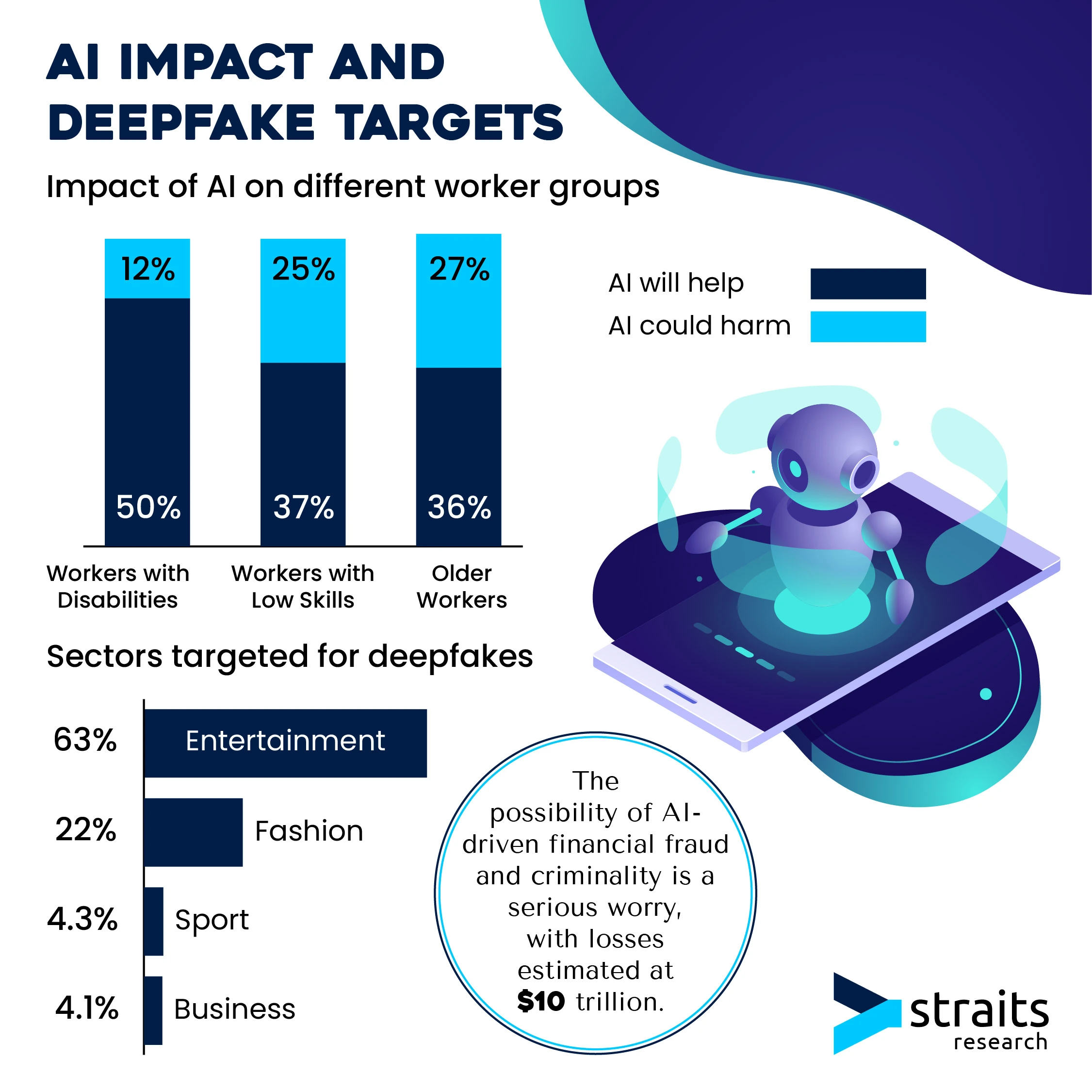AI and Deepfakes transforming industries!

Artificial Intelligence (AI), a leading technological force has the capacity to fundamentally alter many facets of our everyday life. The more this technology is incorporated into society, the more important it is to understand how the public views it. Artificial Intelligence is being used in many sectors of the economy, such as marketing, retail, healthcare, and financial services.
AI's transformative impact across industries
With more than 30% of respondents using AI in their operations in 2023, the financial services sector is leading the way in AI adoption. The use of Artificial Intelligence in product and service development increased by an astounding 11% between 2021 and 2022. With a 25% increase in AI use for strategy and corporate finance, the retail and e-commerce sectors are not far behind. From improving consumer experiences to streamlining supply chains and making tailored recommendations, Artificial Intelligence is transforming various sectors.
AI is also reforming marketing by streamlining sales procedures and improving consumer experiences. Companies employing AI for sales have reported amazing outcomes, like a 50% boost in leads, a 60-70% decrease in call time, and a 40-60% cost reduction. In fact, AI is predicted to add between $2.6 - $4.4 trillion annually, across 63 use cases. Operating departments, marketing, sales, software engineering, and research and development will account for 75% of this total.
Moreover, 64% of B2B marketers consider Artificial Intelligence valuable for their sales and marketing strategies. Though 35.6% of these marketers are concerned that jobs may be at risk due to increased AI use, only 13% of them are extremely confident in their knowledge of AI.
Mixed perceptions and challenges
AI adoption may make some peoples' jobs better, but it may also make others' jobs worse. On the other hand, as AI-enabled assistive devices are becoming more widely available, it is anticipated that AI will help workers with disabilities. Given AI's demand for digital skills, a global survey of 1,400 manufacturing employers found that 50% of respondents thought AI would benefit workers with disabilities and 12% thought it could hurt them. While 25% of respondents believe AI could hurt workers with low skills, 37% of respondents believe it will benefit workers with low skills.
While 27% of respondents believe AI could hurt older workers, 36% of respondents believe it will benefit older workers. There are different perspectives on AI around the world. The proportion in 16 regions including North America, East Asia, the Middle East, Southern Africa, Eastern Europe, and more who think AI will "mostly harm" is higher than that of people who think it will "mostly help". Although there are clear regional differences, the average global ratio (1.4) favors AI as being more advantageous.
Furthermore, the widespread use of deepfake technology is one of the major obstacles facing AI. Deepfakes, or extremely convincingly manipulated media, are major concerns. More than 40% of companies and their clients have already experienced deepfake attacks. Cybersecurity experts have observed deepfakes used in cyberattacks. The most targeted sectors for deepfakes include entertainment (63%) fashion (22%), sports (4.3%), and business (4.1%).
The possibility of AI-driven financial fraud and criminality is a serious worry, with losses estimated at $10 trillion. The banking sector worldwide is making significant efforts to reduce this risk. Deepfake scams have resulted in significant financial losses, for instance, in 2021, a $35 million fraudulent bank transfer was masterminded using AI voice cloning.
Certain nations and areas, including the European Union and China, have put laws or policies pertaining to deepfake technology into effect. Nonetheless, deepfake laws are still not extensively enacted worldwide, and many nations are still debating whether or not to regulate deepfakes at all.
Artificial Intelligence has emerged as a reforming force that will profoundly impact many sectors of the economy and society. Even though it has the potential to increase productivity, worries about job displacement still exist. Governments and businesses must find a proper balance between utilizing AI's advantages and reducing its possible risks.




